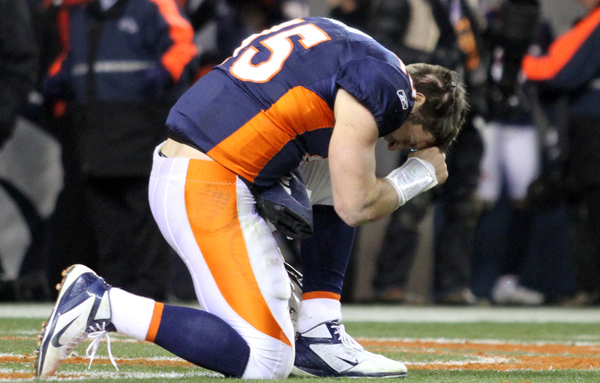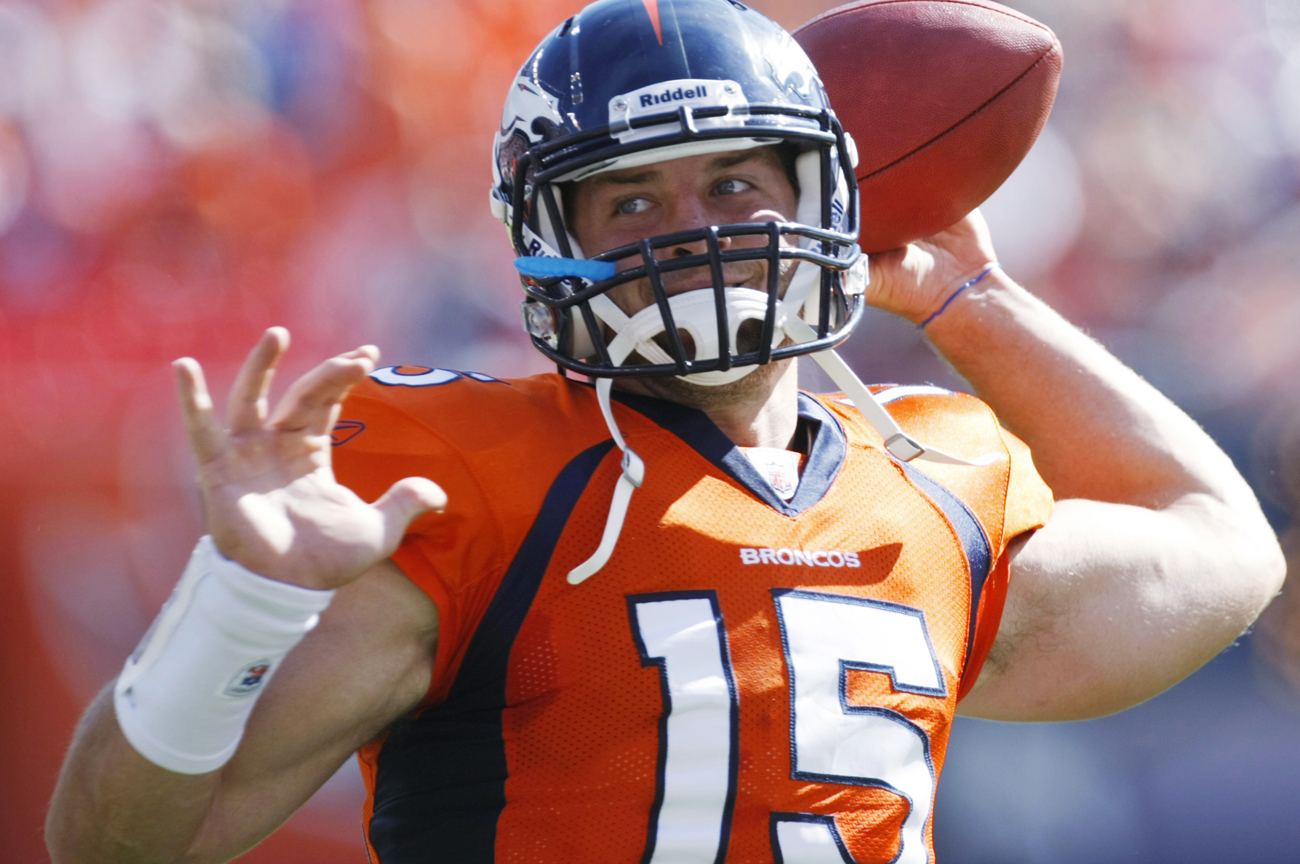His nickname is “God’s quarterback”. Football commentators have said of his play that they “have never seen anything like it”. The Huffington Post once said of him that he has “the ability to kill a man with a forearm and get popcorn to pop by staring at kernels”. He is the biggest thing to happen to American sport in a long time. And he exerts a thrilling hold on the American public imagination, with his astonishing ability to turn a game around singlehandedly in the final moments often described in language verging on the religious. “Miraculous”, “mystifying”: these are some of the epithets frequently attached to 24-year-old Tim Tebow.
Even Tebow’s birth had a touch of the miraculous to it. Tebow’s parents were working as missionaries in the Philippines when he was conceived. His mother suffered a life-threatening infection during pregnancy and her doctor recommended an abortion, anticipating a stillbirth. Her staunch religious faith prevented her from following his advice, and lo – the baby Tebow entered the world right as rain.
Entirely home-schooled, Tebow nonetheless began playing football at an early age, soon becoming one of the most sought-after young players in the country. His mythology on the playing field includes: playing an entire second half of a high-school game with a broken fibula, including scoring a 29-yard touchdown; fracturing his right hand during the third quarter of a college game in 2007 but continuing till the final whistle; playing a 2009 game despite being acutely ill with a respiratory illness. He became the first sophomore to win college football’s highest honour, the Heisman Trophy, in 2007. Everyone wanted Tebow upon his graduation from the University of Florida, but the Denver Broncos nabbed him in the end, in 2010. He has gone on to help the team to a series of stunning upsets, most recently last Sunday, described as the most memorable performance of his career. On that occasion he led his underdog team to snatch victory from the jaws of defeat against the Pittsburgh Steelers, throwing for 316 yards (around 289 metres) and scoring two touchdowns.
It is what happened in the aftermath of the victory, however, that really illustrates what has come to be known as Tebowmania. As commentators dwelled on the 316-yard figure, the Internet exploded as the realisation dawned as to the symbolism of that number. In order to explain why that number should be significant, it’s necessary to mention possibly the most important fact about Tim Tebow, other than his footballing skill: the man is religious. Like, very religious. Like, saving himself for marriage religious. In fact, a journalist from the Huffington Post had the temerity to ask Tebow in 2009 whether he was a virgin – he calmly confirmed it – and there was a national outcry as to the inappropriateness of the questioning. It’s fine to ask Britney Spears that, the logic seemed to run, but not our Tim.
Tebow has become as well known for his religious displays on the playing field as for his throwing arm or running legs. When Tebow scores, without fail, he drops to his knees in an attitude of prayer, one hand pointed aloft at the heavens. This posture has become an Internet meme known as “Tebowing” (www.tebowing.com), where fans take pictures of themselves in outlandish locations adopting his prayerful pose and post them on social media sites. On the website dedicated to the phenomenon, Tebowing is defined as “(vb) to get down on a knee and start praying, even if everyone else around you is doing something completely different”. This is the crux of Tebow’s brand of religious faith: completely public and guileless. He begins post-game press conferences by saying: "First, I'd like to thank my Lord and Saviour Jesus Christ" and ends with "God bless".
During his college football years, he made use of the facial war-paint called “eye black” (black smears under the eyes to reduce glare) to carry religious messages, turning his face, in essence, into a billboard for Christianity. In 2010 the National Collegiate Athletic Association introduced a new regulation, dubbed “Tebow’s Law”, which banned sportsmen from the practice of using their eye black to display messages of any kind. They denied it was as a specific result of Tebow’s habit, but he was certainly the most high-profile sportsman to adopt it at the time.

Before the law kicked in, on the occasion of the 2009 national collegiate championship finals, Tebow led the Florida Gators to victory while wearing the words “John 3:16” in his eye black. John 3:16, as if you needed reminding, is the New Testament passage which reads: “For God so loved the world, that He gave His only begotten Son, that whoever believes in Him shall not perish, but have eternal life”. In the 24 hours after the game, “John 3:16” became the highest-ranked Google search term overnight, generating more than 90-million searches.
Getting back to last Sunday, Tebow throws for 316 yards to win the game. John 3:16; 316 yards. There’s more: Sunday’s game was exactly three years to the day after the occasion when he wore the John 3:16 eye black. If football jargon is intelligible to you, during Sunday’s game he also set an NFL playoff record with 31.6 yards per completion, and for the cherry on the top, viewer ratings on CBS peaked during the game at 31.6.
Convinced that Tim Tebow has a direct link to the Big Guy yet? Probably not: the Internet is full of number-crunching conspiracy theories every day. But the fact that US Internet users would even think to make these connections is a sign of the almost mystical place Tebow has come to occupy in the public understanding. There appears to be not a speck of dirt on Tebow. Every chance he gets, he works at his father’s orphanage in the Philippines. In 2008 he removed himself from consideration for Playboy magazine’s All-American team because it conflicted with his Christian beliefs. In 2009 he met a fan who was a brain tumour victim with impaired hearing and continual tremors, and promptly invited her to be his date at a major sports awards ceremony the following night. Little wonder that in the just-completed annual Zillow Celebrity Neighbour Survey, Tebow was voted the celebrity most Americans would most like to have as a next-door neighbour, easily beating Jennifer Aniston, Brad Pitt and Angelina Jolie.
There have only been two hints of controversy to dog his career. In 2008 he recorded a pro-life advertisement for the Focus on the Family Christian lobby group, based on the story of his miraculous birth. The ad came under fire from pro-choice groups who also objected to the presentation of Tebow’s mother as having declined an abortion out of religious faith: they pointed out that abortion was illegal in the Philippines at the time, so she might well have been equally motivated by pragmatic considerations. The second shadow didn’t even directly involve him: last month, Rabbi Joshua Hammerman wrote a piece for the Jewish Week Wednesday website predicting that if Tim Tebow led the Denver Broncos to Superbowl victory, the result would be fanatical religious chaos, culminating in “burning mosques, bashing gays and indiscriminately banishing immigrants”. The website pulled the story that same day after the public outcry that inevitably follows any Tebow-slamming.
It’s always tempting for social analysts to see a figure like Tebow as standing for more than may strictly be meaningful. Tebow has thus far prompted a rash of theorising as to his significance in contemporary American culture, with the Wall Street Journal going so far as to declare reactions to him “a litmus test of political and social identity”, and Tebow himself “a lightning rod in America’s intermittent culture war of believers vs. secularists”. But in truth, public fascination with the figure of the principled sportsman is nothing new. Consider the historical personage at the centre of 1981 film “Chariots of Fire”: devout Scottish Christian Eric Liddell, who refused to compete in his 100m heat at the 1924 Paris Olympics because it fell upon a Sunday. The idea that sporting prowess and some kind of elevated morality are natural bedfellows is a concept at the heart of what the Olympic Games are supposed to stand for, and the particular pairing of sport and Christianity has been around in modern times since the “Muscular Christianity” movement of the Victorian era.
One online commentator suggested that an appropriate historical analogy with the figure of Tebow would be – hear us out – Seabiscuit, the champion racehorse of the US during the 30s. Just as Seabiscuit became a symbol of hope during the Great Depression, Tebow too seems to offer an injection of inspiration and simple wholesomeness during a period of economic recession and moral decrepitude. Tebow is anachronistic: a throwback to some imagined time that probably never really existed, where young Americans respected their elders, worked hard, attended Church and lived as cleanly as apple pie. Like a character in the “Archie” comics, you might say – except that the next Archie comic, in an attempt to keep up with changing times, features an interracial gay marriage. There’s no hope except Tebow. DM
Read more:
- Tim Tebow: God’s Quarterback, in the Wall Street Journal.
Photos: REUTERS






